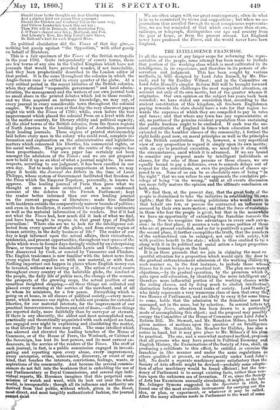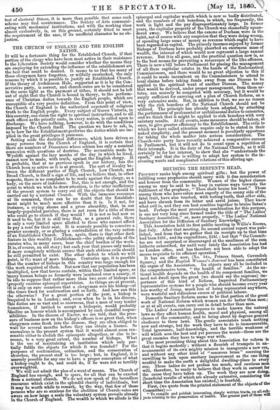THE INTELLIGENCE FRANCHISE.
Ix all the measures of any larger scope for reforming the repre- sentation of the people some attempt has been made to include that portion of the working class which is most cultivated in its intelligence, in its experience, and therefore in its powers of ob- servation and judgment. This has been sought by various methods, in bills designed by Lord John Russell, by Mr. Dis- raeli, and by Sir Finley Wilmot ; and in the Committee on Lord John Russell's simpler Reform Bill will be brought forward a proposition which challenges the most respectful attention, on account not only of its own merits but of the quarter whence it originates. Our own opinion on the subject has years back been recorded ; we have stated our conviction that, according to the ancient constitution of this kingdom, all freeborn Englishmen paying towards the state should have a vote for that region to- wards the expenses of which they are compelled to pay in rates and taxes; and that where any town has any representative at all, no portion of the genuine resident population thus sustaining the public burdens ought to be excluded. If such was the an- cient constitution of England in times when education had not extended to the humbler classes of the community, a fortiori the right holds good now, on moral principles as well as the principles of the British constitution. It is, however, a very superficial view of any proposition to regard it simply upon its own merits; with an eye to practical execution, we must take it along wit the circumstances, amid which it is advanced. If we are bound to consider any proposal made by intelligent individuals or classes, for the sake of those persons or those classes, we are equally bound to pay a deference, even to concede delays out of respect for the convictions, or even the prejudices of classes op- posed to us. None of us can be so absolutely sure of being the right" that we can refuse to our opponents the corelative pri- vilege of being "in the wrong," until at all events discussion. can more fully mature the opinion and the ultimate conclusion on both sides.
We find then at the present day, that the great body of the people is disinclined to take the initiative in establishing its own. rights that the more far-seeing politicians who would move in that behalf are few, or possess too contracted an influence to succeed by their own mere motion ; and that the force of resistaneo in those who fear the people is great, but that in the meanwhile we have an opportunity of extending the franchise towards the people. Now we recognize two advantages in every such exten- sion: in the first place it secures a vote to some portion of those who are at present excluded, and so far is positively a good; and'in the second place, it further exemplifies the truth, that the numbus of the enfranchised can be enlarged, not only with safety, bat with positive benefit to the state ; which is thus enabled to MI a along with it in its political and social action a larger proportion of living human beings on the land.
It is on these grounds that we join in claiming the most re. spectful attention for a proposition which would ;*n the door ti;) the gradual enfranchisement admission of the working c asTres-piri such manner as, in the first instance, to include those whoseir" fitness for it can be put to a practical test. The plan meets manyt objections,—by its gradual operation, by the premium which it
puts upon self-education, by identifying the more intelligent anti'therefore more influential portion of the working classes with- the ruling classes, and by doing much to abolish intellectuaPs. distinction between the several ranks of society. Lord Stanley,.,' who fairly represents a very numerous class of men that sway thqi two Houses of Parliament, and are likely to sway it for some timen- to come, holds that the admission to the franchise must beg' managed, not in the mass, but by selection. In several letters ta the Daily Yews, attention has been drawn to a particular mode of accomplishing this object ; and the proposal may possibly occupy the Committee of the House of Commons upon Lord John's Reform Bill. Mr. Stewart, and Mr. Monckton Manes, have both given notices of motions upon the question of an Intelligence Franchise. Mr. Stansfeld, the Member for Halifax, has also a notice in hand, but it may give place to Mr. Milnes's if his pl be practical. The one, and a somewhat matured method, propos that all persons who may have passed in Political Economy a English History, the Examinations of the Society of Arts, shall, producing a certificate to this effect, be entitled to exercise MI franchise in like manner and under the mune regulations as others qualified at present, or subsequently under Lord John's bill. No doubt a separate machinery more satisfactory than the Society of Arts affords might be devised—probably some adapta- tion of other machinery would be found efficient; but the ten- dency of Parliament is to accept existing facts, rather than ven- ture upon the unknown sea of invention. If so, since the Society found one of the most available instruments for earryinge ou th. it might, as the late of Arts has Examiners annually circulating, Mr. Jelinger Symons suggested in the pectator in 185t, _b: idea or plan, or experiment, or whatever it may b ef After the many allusions made in Parliament to the want o some
test of electoral fitness, it is more than possible that some such scheme may find countenance. The Society- of Arts communi- cating with mechanics' institutions, and with the working class almost exclusively, is, on this ground, certainly fitted to meet the requirement of the case, if its unofficial character be no ob- jection.



























 Previous page
Previous page